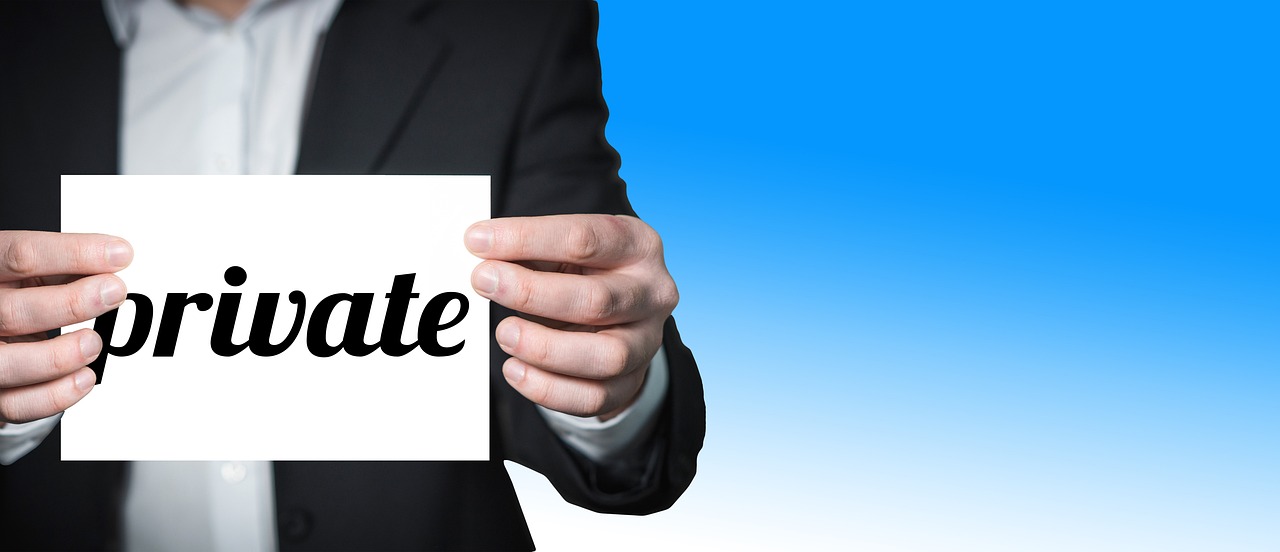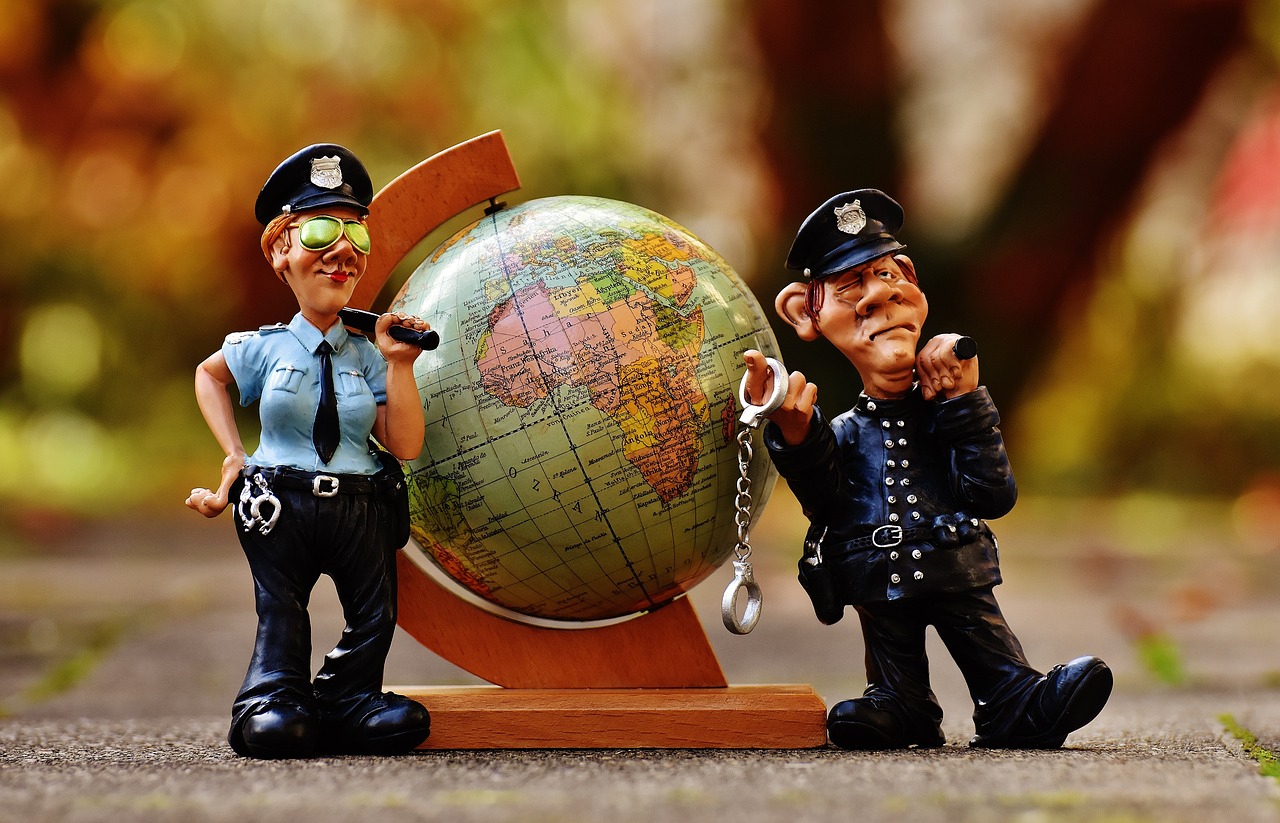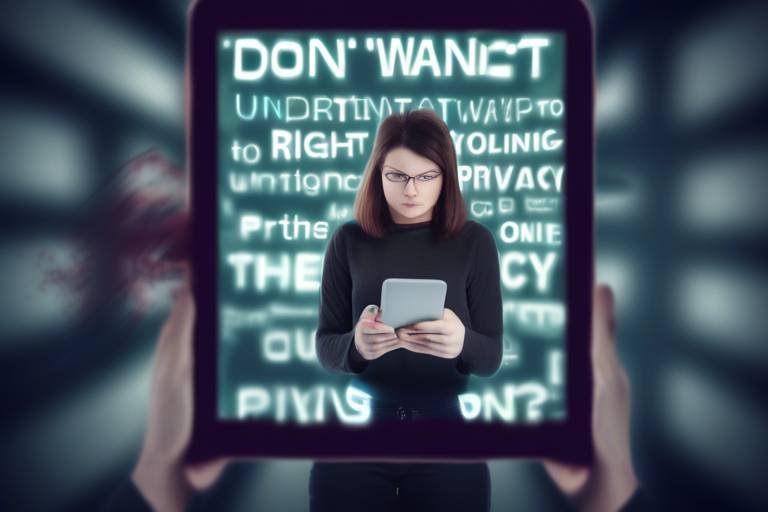Understanding Your Right to Privacy Online
In today's digital world, where every click can be tracked and every interaction can be logged, understanding your right to privacy online is more crucial than ever. The internet has transformed the way we communicate, shop, and even socialize, but with these conveniences come significant risks to our personal information. Have you ever stopped to think about who has access to your data? Or how it might be used against you? These questions are not just rhetorical; they are essential to understanding your digital footprint.
Online privacy is not merely a luxury; it's a fundamental right that allows individuals to maintain control over their personal information. Imagine walking through a crowded street, and every passerby is taking notes about your conversations, your preferences, and even your habits. Sounds invasive, right? This is essentially what happens online, where data collection is rampant. From social media platforms to online retailers, companies are constantly gathering information to tailor their services or sell to third parties. In this context, understanding your rights is your first line of defense.
Moreover, the implications of not safeguarding your online privacy can be severe. Identity theft, financial fraud, and unwanted solicitation are just the tip of the iceberg. This is why it’s imperative to grasp the nuances of online privacy laws and regulations that govern how your data is collected, used, and shared. By being informed, you can take proactive steps to protect yourself. You wouldn’t leave your front door wide open in a busy neighborhood, would you? The same logic applies to your online presence.
So, what can you do to ensure your online privacy? First, familiarize yourself with the legal frameworks that are in place to protect your rights, like the General Data Protection Regulation (GDPR) and the California Consumer Privacy Act (CCPA). These laws are designed to empower you, giving you the ability to control your personal data. In the following sections, we will delve deeper into these regulations and provide practical steps you can take to bolster your online privacy. By taking charge of your digital life, you can navigate the internet with confidence and security.
Online privacy is crucial for protecting personal information from misuse. Understanding its significance helps individuals make informed decisions about their digital interactions and safeguard their personal data.
Various laws and regulations, such as GDPR and CCPA, aim to protect online privacy. This section examines these legal frameworks and their impact on individuals and businesses alike.
The GDPR is a comprehensive regulation in the EU that enhances individuals' control over their personal data. It sets guidelines for data collection, processing, and storage to ensure privacy rights are upheld.
GDPR is based on several core principles, including transparency, data minimization, and accountability. Understanding these principles can help individuals recognize their rights and the responsibilities of organizations.
Individuals have specific rights under GDPR, including the right to access, rectify, and erase their data. This section details these rights and how they empower individuals in the digital landscape.
The CCPA is a state law that enhances privacy rights for California residents. It provides consumers with greater control over their personal information collected by businesses.
There are several effective strategies individuals can adopt to enhance their online privacy, from using VPNs to adjusting privacy settings on social media platforms.
Virtual Private Networks (VPNs) can help protect your online activities from prying eyes. This section explains how VPNs work and their benefits for maintaining privacy while browsing.
Social media platforms often collect extensive data. Learning how to adjust privacy settings can significantly reduce the amount of personal information shared publicly.
- What is online privacy? Online privacy refers to the level of security and control an individual has over their personal information while using the internet.
- Why is online privacy important? It helps protect individuals from identity theft, data breaches, and unwanted solicitation, ensuring that personal information is not misused.
- What laws protect online privacy? Key laws include the General Data Protection Regulation (GDPR) in Europe and the California Consumer Privacy Act (CCPA) in the United States.
- How can I protect my online privacy? Use VPNs, adjust your social media privacy settings, and be cautious about the information you share online.

The Importance of Online Privacy
In today's digital landscape, online privacy is not just a luxury; it's a necessity. With every click, like, and share, we leave behind a trail of personal information that can be exploited by various entities, from advertisers to cybercriminals. Have you ever wondered what happens to your data once you hit that 'submit' button? The reality is, your information can be used in ways you might never have imagined. This is why understanding the importance of online privacy is crucial for everyone navigating the web.
Consider this: every time you browse the internet, you are essentially opening a window into your life. Your search history, social media interactions, and even your online purchases tell a story about who you are. If you're not careful, that story can be manipulated or misused. The stakes are high, especially with increasing reports of data breaches and identity theft. Protecting your online privacy means safeguarding your personal information from falling into the wrong hands.
Furthermore, the implications of neglecting online privacy extend beyond just personal loss. When individuals become victims of data breaches, it can lead to a ripple effect, affecting not only their finances but also their mental well-being. The fear of being watched or having one's identity stolen can create a significant amount of stress and anxiety. Therefore, maintaining your online privacy is not merely about keeping secrets; it’s about preserving your peace of mind.
Moreover, the significance of online privacy is reflected in the growing awareness and demand for privacy rights. People are increasingly questioning how their data is collected, stored, and used. This shift in mindset has led to a surge in privacy-centric tools and technologies. For instance, many are now turning to encrypted messaging apps and secure browsers to protect their communications and browsing habits. The more we educate ourselves about our rights and the risks associated with online activities, the better equipped we become to take control of our digital lives.
In conclusion, online privacy is not just about keeping your personal information safe; it’s about empowering yourself in an increasingly interconnected world. It's about making informed choices and understanding the implications of your digital footprint. As you navigate your online journey, remember that your privacy is your right, and protecting it should be a priority. So, take a moment to evaluate your online habits and consider what steps you can take to enhance your privacy. After all, in the vast digital ocean, it's essential to keep your personal island secure.

Legal Frameworks Governing Online Privacy
In today's digital landscape, where our lives are intertwined with technology, understanding the legal frameworks that govern online privacy is not just important—it's essential. Various laws and regulations have been established to protect individuals from the misuse of their personal information. These legal frameworks aim to create a safer online environment, empowering users to take control of their data and hold organizations accountable for their practices.
Two of the most significant regulations that have emerged in recent years are the General Data Protection Regulation (GDPR) and the California Consumer Privacy Act (CCPA). Both of these laws represent a shift towards greater transparency and accountability in how personal data is handled by businesses. They are not just legal jargon; they have real implications for how we interact with technology and the companies that provide digital services.
The GDPR, implemented in May 2018, is a comprehensive regulation in the European Union that enhances individuals' control over their personal data. It sets strict guidelines for data collection, processing, and storage, ensuring that privacy rights are upheld. Under the GDPR, organizations must obtain explicit consent from users before collecting their data, and they are required to inform individuals about how their data will be used. This regulation has set a high standard for data protection and has influenced privacy laws worldwide.
On the other hand, the CCPA, which came into effect in January 2020, is a state law that aims to enhance privacy rights for California residents. It provides consumers with greater control over their personal information collected by businesses. Under the CCPA, individuals have the right to know what personal data is being collected about them, the right to delete that data, and the right to opt out of the sale of their personal information. This law reflects a growing recognition of the importance of privacy in the digital age, particularly in a state that is home to many tech giants.
To give you a clearer understanding of these frameworks, let's take a look at a comparison table:
| Feature | GDPR | CCPA |
|---|---|---|
| Scope | Applies to all EU citizens and residents | Applies to California residents |
| Consent Requirement | Explicit consent required for data collection | Opt-out option for data sale |
| User Rights | Right to access, rectify, and erase data | Right to know and delete personal information |
| Enforcement | Fines up to €20 million or 4% of annual revenue | Fines up to $7,500 per violation |
Understanding these laws is crucial for individuals navigating the online world. They not only protect personal data but also create a culture of accountability among businesses. As a user, being aware of your rights under these regulations can empower you to take action if your privacy is compromised. So, the next time you sign up for a service or share your information online, remember that you have rights, and there are laws in place designed to protect you.
- What is the GDPR? The General Data Protection Regulation is a law in the EU that protects personal data and privacy.
- What rights do I have under the CCPA? California residents have rights to know, delete, and opt out of the sale of their personal information.
- How can I exercise my rights under these regulations? You can contact the organization that holds your data to request access, rectification, or deletion.

General Data Protection Regulation (GDPR)
This article explores the concept of online privacy, the laws governing it, and practical steps individuals can take to protect their personal information in the digital age.
Online privacy is crucial for protecting personal information from misuse. Understanding its significance helps individuals make informed decisions about their digital interactions and safeguard their personal data.
Various laws and regulations, such as GDPR and CCPA, aim to protect online privacy. This section examines these legal frameworks and their impact on individuals and businesses alike.
The General Data Protection Regulation, commonly known as GDPR, is a comprehensive regulation enacted by the European Union that significantly enhances individuals' control over their personal data. Implemented in May 2018, this regulation sets forth strict guidelines for how organizations collect, process, and store personal information, ensuring that privacy rights are not just an afterthought but a fundamental principle. GDPR applies to any organization that handles the data of EU citizens, regardless of where the organization is based, making it a global standard for data protection.
One of the most striking aspects of GDPR is its emphasis on transparency. Organizations are required to clearly inform individuals about how their data will be used, which is a significant shift from previous practices where such information was often buried in lengthy terms and conditions. This shift empowers users to make informed choices about their data, almost like shining a flashlight on a previously dark path.
The GDPR is built on several core principles that guide its implementation. These principles are not just legal jargon; they represent a new ethos in how we handle personal data. Here are some of the key principles:
- Transparency: Organizations must provide clear and accessible information about data collection and usage.
- Data Minimization: Only the necessary data for a specific purpose should be collected.
- Accountability: Organizations are responsible for ensuring compliance with GDPR and must demonstrate their adherence to its principles.
Understanding these principles can help individuals recognize their rights and the responsibilities of organizations in protecting personal data. Think of it as a safety net that not only catches you when you fall but also prevents you from falling in the first place.
Under GDPR, individuals are endowed with specific rights that empower them in the digital landscape. These rights include:
- The Right to Access: Individuals can request access to their personal data held by organizations.
- The Right to Rectification: Individuals have the right to correct inaccurate or incomplete data.
- The Right to Erasure: Also known as the "right to be forgotten," individuals can request the deletion of their personal data under certain conditions.
These rights are not just theoretical; they provide individuals with practical tools to manage their online presence. For instance, if you discover that a company has incorrect information about you, you can demand that they fix it. It’s like having a personal data manager in your corner, ready to advocate for your privacy.
The CCPA is a state law that enhances privacy rights for California residents. It provides consumers with greater control over their personal information collected by businesses.
There are several effective strategies individuals can adopt to enhance their online privacy, from using VPNs to adjusting privacy settings on social media platforms.
Virtual Private Networks (VPNs) can help protect your online activities from prying eyes. This section explains how VPNs work and their benefits for maintaining privacy while browsing.
Social media platforms often collect extensive data. Learning how to adjust privacy settings can significantly reduce the amount of personal information shared publicly.
Q1: What is GDPR?
A1: GDPR stands for the General Data Protection Regulation, a law in the EU that protects individuals' personal data and privacy.
Q2: Who does GDPR apply to?
A2: GDPR applies to any organization that processes personal data of EU citizens, regardless of where the organization is located.
Q3: What rights do I have under GDPR?
A3: Under GDPR, you have rights including the right to access your data, rectify inaccuracies, and request erasure of your data.
Q4: How can I protect my online privacy?
A4: You can protect your online privacy by using VPNs, adjusting social media privacy settings, and being mindful of the information you share online.

Key Principles of GDPR
The General Data Protection Regulation (GDPR) is built upon a foundation of core principles that guide how personal data should be handled. Understanding these principles is essential for both individuals and organizations as they navigate the complexities of data privacy in today's digital landscape. Let's break down these principles:
- Transparency: Organizations must be clear about how they collect, use, and manage personal data. This means providing individuals with accessible information regarding their data practices.
- Data Minimization: Only the necessary data for a specific purpose should be collected. This principle encourages organizations to limit data collection to what is absolutely essential.
- Accountability: Organizations are responsible for ensuring compliance with GDPR principles and must demonstrate that they are taking appropriate measures to protect personal data.
- Purpose Limitation: Personal data should only be collected for specified, legitimate purposes and not further processed in a manner incompatible with those purposes.
- Data Integrity and Confidentiality: Organizations must ensure that personal data is processed securely, protecting it against unauthorized access and breaches.
These principles not only empower individuals but also create a framework that encourages organizations to handle personal data responsibly. For instance, when a company collects your email address, it should be for a specific reason—like sending you a newsletter—and they cannot use it for unrelated purposes without your consent. This is where the principle of purpose limitation comes into play, ensuring that your data isn't misused or exploited.
Moreover, the principle of accountability means that companies must be proactive in demonstrating their compliance with GDPR. This could involve regular audits, training staff on data protection, and implementing strong data security measures. By understanding these principles, individuals can better recognize their rights and the responsibilities of organizations when it comes to their personal data.
In essence, the key principles of GDPR create a balanced approach to data privacy, fostering trust between individuals and organizations. As we continue to interact more with digital platforms, being aware of these principles can significantly enhance our understanding of how our personal information is treated and safeguarded.
1. What is the purpose of GDPR?
GDPR aims to protect the privacy and personal data of individuals within the European Union and the European Economic Area. It provides individuals with greater control over their personal information and establishes strict guidelines for organizations on data handling.
2. Who does GDPR apply to?
GDPR applies to all organizations that process personal data of individuals within the EU, regardless of where the organization is based. This means that even non-EU companies must comply if they handle EU citizens' data.
3. What rights do individuals have under GDPR?
Individuals have several rights under GDPR, including the right to access their data, the right to rectify inaccuracies, the right to erase their data, and the right to object to processing under certain circumstances.
4. What happens if an organization violates GDPR?
Organizations that fail to comply with GDPR can face significant fines, which can be up to 4% of their annual global turnover or €20 million, whichever is higher. This serves as a strong incentive for organizations to prioritize data protection.

Rights Under GDPR
The General Data Protection Regulation (GDPR) is not just a set of rules; it's a powerful framework designed to give individuals more control over their personal data. Imagine having a toolbox filled with rights that you can use to protect yourself in the digital world. Each tool represents a right that empowers you to manage how your information is handled. Let's take a closer look at these rights and how they can benefit you.
First and foremost, you have the right to access your personal data. This means you can request to see what information companies hold about you. It's your data, after all! Companies are required to provide you with a copy of your data, free of charge, in a format that is easy to understand. Think of it as peeking behind the curtain to see what’s going on with your information.
Next up is the right to rectification. If you spot any inaccuracies in your data, you can ask for corrections. This is crucial because incorrect information can lead to unwanted consequences. For example, if a company has your old address, they might send important documents to the wrong place. With this right, you can ensure that your data is accurate and up-to-date.
Then there’s the right to erasure, often referred to as the 'right to be forgotten'. This allows you to request the deletion of your personal data under certain circumstances. For instance, if you no longer want a company to hold your data or if you believe it was unlawfully processed, you can ask them to wipe it clean. It’s like hitting the reset button on your digital footprint.
Additionally, you have the right to restrict processing. This means you can ask companies to limit how they use your data. For example, if you’re not ready to fully delete your information but want to pause its usage, this right gives you that option. It’s like putting your data on hold while you figure things out.
Moreover, the right to data portability allows you to transfer your data from one service provider to another. This is particularly useful when switching between services, like moving your music playlists from one platform to another without losing any of your favorite songs. You can take your data with you, making it easier to switch services without the hassle of starting from scratch.
Finally, the right to object empowers you to challenge the processing of your data in certain situations. If you feel that your data is being used for marketing purposes without your consent, you can object to this use. This right is essential for maintaining control over how your data is utilized.
In summary, the rights under GDPR are like a shield that protects your personal information in the vast digital landscape. Understanding and exercising these rights can significantly enhance your online privacy and give you peace of mind. Remember, your data is yours, and you have the power to control it!
- What is the GDPR?
GDPR stands for General Data Protection Regulation, a regulation in EU law on data protection and privacy.
- Who does GDPR apply to?
GDPR applies to all organizations that process personal data of individuals in the EU, regardless of where the organization is based.
- Can I exercise my rights under GDPR if I live outside the EU?
If a company processes your data while you are in the EU, you can still exercise your rights under GDPR.
- What should I do if my rights are violated?
You can file a complaint with a supervisory authority in your country or seek legal advice.

California Consumer Privacy Act (CCPA)
The is a landmark piece of legislation that was enacted to empower consumers, giving them greater control over their personal information. This act applies to businesses that collect personal data from California residents, regardless of where the business is located. It's like putting a protective shield around your personal data, ensuring that you have a say in how it's used and shared. Imagine walking into a store where you are not just a face in the crowd but a valued customer whose preferences and privacy are respected. That's the essence of the CCPA.
Under the CCPA, consumers have the right to know what personal information is being collected about them, the purpose of its collection, and whether it is being sold to third parties. This transparency is crucial in a world where data is often treated as a commodity. Think of it as having a window into the back office of a store; you can see what’s happening with your information and make informed decisions based on that insight.
Moreover, the CCPA grants consumers the right to request the deletion of their personal information held by businesses. This gives individuals a powerful tool to reclaim their privacy, much like being able to erase a digital footprint that you no longer want to be associated with. Additionally, consumers can opt-out of the sale of their personal information, allowing them to take back control over their data in an era where data trading is rampant.
To illustrate the breadth of the CCPA's impact, let's take a look at some of the key rights it provides:
- The Right to Know: Consumers can request details about the personal information a business collects, uses, and shares.
- The Right to Delete: Consumers can ask businesses to delete their personal information, subject to certain exceptions.
- The Right to Opt-Out: Consumers have the option to opt-out of the sale of their personal information to third parties.
- The Right to Non-Discrimination: Consumers are protected from discrimination for exercising their rights under the CCPA.
It's important to note that the CCPA is not just a win for consumers; it also places significant responsibilities on businesses. Companies must implement processes to comply with these rights, which can lead to a more transparent and ethical approach to data handling. The act has sparked a broader conversation about privacy rights across the United States, prompting other states to consider similar legislation.
In conclusion, the CCPA represents a significant shift in the landscape of consumer privacy rights, serving as a model for future regulations. As we navigate through this digital age, understanding and exercising our rights under the CCPA is more important than ever. It’s not just about protecting ourselves; it’s about fostering a culture of respect for personal information that can inspire other regions to follow suit.
1. What does the CCPA do?
The CCPA gives California residents the right to know what personal data is being collected about them, the right to delete that data, and the right to opt-out of the sale of their personal information.
2. Who does the CCPA apply to?
The CCPA applies to businesses that collect personal information from California residents and meet certain revenue or data processing thresholds, regardless of where the business is located.
3. How can I exercise my rights under the CCPA?
You can exercise your rights by submitting requests to businesses regarding your personal information, such as asking for disclosures or requesting deletion.
4. Are there penalties for non-compliance with the CCPA?
Yes, businesses that fail to comply with the CCPA may face fines and penalties, encouraging them to adhere to the regulations set forth in the act.

Practical Steps to Protect Your Privacy
In today's digital landscape, where our lives are increasingly intertwined with technology, protecting your online privacy is more important than ever. But how can you navigate this complex web of data collection and surveillance? Fear not! There are several practical steps you can take to safeguard your personal information and maintain your privacy while surfing the web.
First and foremost, consider using a Virtual Private Network (VPN). A VPN acts as a secure tunnel for your internet traffic, encrypting your data and masking your IP address. This means that your online activities are hidden from prying eyes, whether they be hackers or even your internet service provider. When you connect to a VPN, your data is routed through a server in another location, making it difficult for anyone to trace your online movements back to you. It's like wearing an invisibility cloak while browsing the internet!
Another essential tip is to adjust your privacy settings on social media platforms. Many users are unaware of just how much personal information they share publicly. By diving into the settings of platforms like Facebook, Instagram, and Twitter, you can control who sees your posts, who can send you friend requests, and what information is visible on your profile. For instance, you might want to limit your profile visibility to 'Friends Only' or even customize it further to exclude certain individuals. Taking these steps can significantly reduce the amount of personal data that is accessible to strangers.
Additionally, be cautious about the permissions you grant to apps on your devices. Many applications request access to your contacts, camera, or location, but do you really need to share that information? Before downloading an app, ask yourself if it's essential for the app's functionality. If not, deny those permissions. This simple act can prevent unnecessary data collection and keep your personal information more secure.
Moreover, it's wise to regularly update your passwords and use a password manager. A strong password is your first line of defense against unauthorized access. Instead of using easily guessable passwords like '123456' or 'password', create complex ones that include a mix of letters, numbers, and special characters. A password manager can help you generate and store these complex passwords securely, so you don't have to remember them all. Think of it as your digital vault, keeping your secrets safe!
Lastly, be vigilant about the websites you visit. Always look for HTTPS in the URL, which indicates that the site is secure. Avoid entering sensitive information on sites that do not have this security feature. Additionally, consider using privacy-focused browsers such as Brave or Firefox, which offer enhanced privacy features and block trackers by default. These browsers act like your personal bodyguards, ensuring that your online activities remain private.
To summarize, protecting your online privacy is not just a one-time task; it's an ongoing process. By implementing these practical steps, you can take control of your personal information and navigate the digital world with confidence. Remember, your privacy is your right, and it’s worth fighting for!
- What is a VPN and how does it work? A VPN encrypts your internet traffic and hides your IP address, providing a secure connection to the internet.
- Why should I adjust my social media privacy settings? Adjusting these settings helps control who can see your personal information and posts, reducing the risk of data misuse.
- How often should I change my passwords? It's advisable to change your passwords every few months and use unique passwords for different accounts.
- What should I look for in a secure website? Always look for 'HTTPS' in the URL, which indicates that the site is secure for transactions and data entry.

Using VPNs for Enhanced Security
In today's digital age, where our lives are increasingly intertwined with the internet, the need for robust online security has never been more critical. One of the most effective tools at your disposal is a Virtual Private Network (VPN). But what exactly is a VPN, and how can it enhance your online security? Let’s dive into the details.
A VPN acts as a secure tunnel between your device and the internet, encrypting your data as it travels. This means that even if someone were to intercept your internet traffic, they would only see a jumble of encrypted information rather than your personal data. Imagine sending a postcard versus sending a sealed letter; the postcard is easily read by anyone who handles it, while the sealed letter keeps your message private. Similarly, a VPN ensures that your online activities remain confidential.
When you connect to a VPN, your internet traffic is routed through a server operated by the VPN provider. This not only masks your IP address but also makes it appear as if you are browsing from a different location. This feature is particularly useful for accessing content that may be restricted in your region. For example, if you’re traveling abroad and want to watch your favorite shows from home, a VPN can help you bypass those geographical restrictions.
Here are some of the key benefits of using a VPN:
- Enhanced Privacy: Your online activities are shielded from prying eyes, including hackers and government surveillance.
- Secure Public Wi-Fi Usage: Public Wi-Fi networks are notoriously insecure. A VPN encrypts your data, protecting you from potential threats.
- Bypass Geo-Restrictions: Access content from anywhere in the world, as if you were browsing from your home country.
- Data Protection: VPNs can help prevent data theft, especially when using unsecured networks.
However, it’s essential to choose a reputable VPN provider. Not all VPNs are created equal, and some may log your data or compromise your privacy in other ways. Look for providers that offer a strict no-logs policy, strong encryption standards, and a transparent privacy policy. Additionally, consider the speed and reliability of the service, as a slow VPN can hinder your browsing experience.
In conclusion, using a VPN is a smart move for anyone looking to enhance their online security. It not only protects your sensitive information but also provides you with the freedom to browse the internet without restrictions. As the digital landscape continues to evolve, taking proactive steps to safeguard your privacy is more important than ever.
Q: What is a VPN?
A VPN, or Virtual Private Network, is a service that encrypts your internet connection and hides your IP address, providing a secure and private browsing experience.
Q: Do I need a VPN if I have antivirus software?
While antivirus software protects against malware and viruses, a VPN adds an extra layer of security by encrypting your data and shielding your online activities from prying eyes.
Q: Can I use a VPN on my smartphone?
Yes! Most VPN providers offer apps for smartphones and tablets, allowing you to secure your mobile internet connection easily.
Q: Is using a free VPN safe?
Free VPNs can come with risks, such as data logging and limited security features. It's generally safer to choose a reputable paid VPN service.

Adjusting Social Media Privacy Settings
In today's digital landscape, social media platforms have become integral to our daily lives. However, with the convenience of sharing and connecting comes the risk of exposing personal information to unwanted eyes. Adjusting your social media privacy settings is one of the most effective ways to take control of your personal data and ensure that you are sharing only what you want, with whom you want.
First and foremost, it's essential to understand that each social media platform has its own set of privacy settings. Whether you are using Facebook, Instagram, Twitter, or LinkedIn, the steps to enhance your privacy may vary. For instance, on Facebook, you can navigate to the 'Settings' menu, where you will find options to manage who can see your posts, who can send you friend requests, and even who can look you up using your email or phone number. This level of customization allows you to tailor your privacy to your comfort level.
Moreover, it is crucial to regularly review these settings as platforms frequently update their privacy policies and features. This means that what was once private may inadvertently become public with a simple change in the platform's default settings. For example, if you recently joined a new platform, you might want to scrutinize its privacy settings to understand how your data is being used and shared.
Here are some key areas to focus on when adjusting your social media privacy settings:
- Profile Visibility: Decide who can view your profile. Most platforms allow you to choose between public, friends only, or custom settings.
- Post Privacy: Choose who can see your posts. You can set this for each post individually or set a default for all posts.
- Tagging Options: Control who can tag you in photos and posts, which can help limit unwanted exposure.
- Location Sharing: Be cautious about sharing your location in posts and check if location services are turned off for the app.
Additionally, be mindful of third-party apps linked to your social media accounts. These apps can access your personal information, so it's wise to review and revoke access to any that you no longer use or trust. In some cases, you may find that an app has permissions to post on your behalf or access your friends list, which can be a breach of privacy if not managed properly.
Finally, consider the content you are sharing. Even with tight privacy settings, once something is posted online, it can be challenging to completely erase it. Think of your social media presence as a digital footprint; every post, photo, and comment contributes to your online identity. Therefore, before hitting that 'post' button, ask yourself: Is this something I want to be associated with forever? By being intentional about what you share, you can significantly enhance your privacy.
In conclusion, adjusting your social media privacy settings is not just a one-time task but an ongoing process. Make it a habit to periodically review your settings and stay informed about any changes that may affect your privacy. By taking these steps, you can enjoy the benefits of social media while keeping your personal information safe from prying eyes.
Q1: Why is it important to adjust my social media privacy settings?
A1: Adjusting your privacy settings is crucial to protect your personal information from being accessed by unwanted individuals or organizations. It allows you to control who sees your content and how your data is shared.
Q2: How often should I review my privacy settings?
A2: It is advisable to review your privacy settings regularly, especially after any major updates to the platform or if you notice changes in how your information is being used.
Q3: Can I limit who sees my past posts?
A3: Yes, most social media platforms allow you to adjust the visibility of past posts, either individually or in bulk, so you can enhance your privacy retroactively.
Q4: What should I do if I feel my privacy has been compromised?
A4: If you believe your privacy has been compromised, immediately adjust your settings to enhance your privacy, remove any suspicious apps, and consider reporting the issue to the platform.
Frequently Asked Questions
- What is online privacy and why is it important?
Online privacy refers to the ability of individuals to control their personal information and how it is collected, used, and shared on the internet. It's crucial because it protects sensitive data from misuse, identity theft, and unwanted surveillance. In a world where our digital footprints are constantly growing, understanding and safeguarding our privacy is more important than ever.
- What laws protect my online privacy?
Several laws aim to protect online privacy, with two of the most significant being the General Data Protection Regulation (GDPR) in the EU and the California Consumer Privacy Act (CCPA) in the United States. These regulations provide individuals with rights regarding their personal data and impose obligations on businesses to handle that data responsibly.
- What are my rights under the GDPR?
Under the GDPR, you have several rights, including the right to access your data, the right to rectify inaccuracies, and the right to request deletion of your data. These rights empower you to take control of your personal information and ensure that organizations are held accountable for how they manage your data.
- How does the CCPA benefit California residents?
The CCPA provides California residents with enhanced rights over their personal information. It allows consumers to know what data is being collected about them, the right to opt-out of data sales, and the ability to request the deletion of their personal information. This law gives individuals more control and transparency regarding their data privacy.
- How can I enhance my online privacy?
There are several effective strategies to enhance your online privacy, such as using Virtual Private Networks (VPNs) to encrypt your internet connection, adjusting privacy settings on social media platforms, and being cautious about the information you share online. Taking these steps can significantly reduce your exposure to privacy risks.
- What is a VPN and how does it work?
A Virtual Private Network (VPN) is a service that creates a secure connection over the internet, allowing you to browse anonymously and protect your data from prying eyes. By masking your IP address and encrypting your internet traffic, a VPN ensures that your online activities remain private and secure, making it a valuable tool for anyone concerned about their online privacy.
- How do I adjust my social media privacy settings?
To adjust your social media privacy settings, go to the settings or privacy section of your profile. Here, you can control who sees your posts, manage friend requests, and limit data sharing with third-party apps. Regularly reviewing and updating these settings helps you maintain a level of privacy that aligns with your comfort level.



















